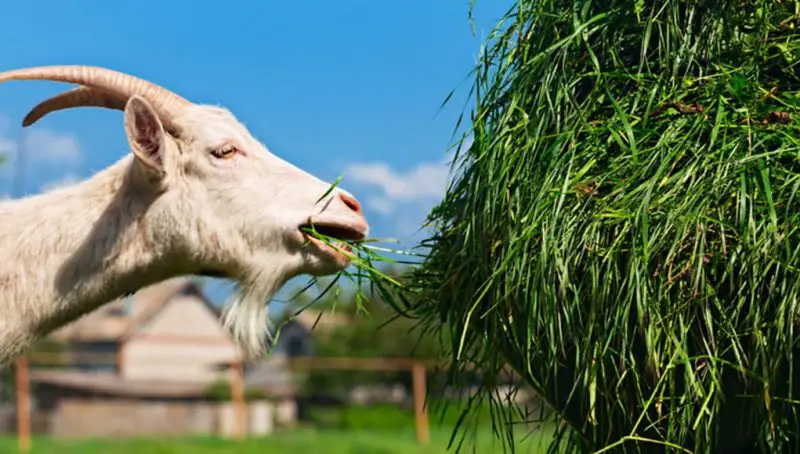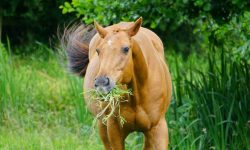Goats are incredibly versatile animals with a natural talent for thriving in almost any environment. Known for their playful nature and endless curiosity, goats will nibble on almost anything they encounter. However, despite the myth that goats eat “everything,” their diet is actually quite specific. They are herbivores that thrive on a wide variety of plants, shrubs, and roughage — not trash or plastic as people often think.
Understanding what goats eat is essential to keeping them healthy, energetic, and productive. Whether they are raised for milk, meat, or companionship, goats need a diet rich in fiber, vitamins, and minerals. Their ability to browse a diverse range of vegetation also helps manage land and control weeds naturally.
In this article, we’ll explore the fascinating world of goat nutrition — starting with how their digestive system works and then breaking down the 20 foods goats love the most.
Understanding The Goat Diet

Goats Are Natural Browsers
Goats are not like cows or sheep that graze mainly on grass. Instead, they are browsers, meaning they prefer shrubs, leaves, vines, bark, and weeds. This natural behavior allows them to reach vegetation that other farm animals cannot, making them extremely efficient foragers.
Their strong lips and agile tongues help them pluck leaves, flowers, and shoots with precision. Because of this, goats can survive in areas where food sources are sparse, such as hilly or semi-arid regions.
The Ruminant Digestive System
Goats are ruminants, possessing a four-chambered stomach: the rumen, reticulum, omasum, and abomasum. This complex digestive system allows them to extract maximum nutrition from fibrous plant materials.
When goats eat, the food first enters the rumen, where billions of beneficial microbes begin breaking down cellulose. Later, goats regurgitate partially digested food, known as cud, and chew it again to improve digestion. This process allows them to gain nutrients that many animals cannot access.
Importance Of A Balanced Diet
A healthy goat diet includes a combination of roughage (like hay and pasture), concentrated feeds (such as grains), and mineral supplements. Water is also crucial — goats need fresh, clean water daily to maintain digestion and milk production.
A well-balanced diet supports not only physical health but also strong immune systems, better reproduction, and high-quality milk and meat yields.
20 Foods Goats Love The Most
1. Grass
Although goats are natural browsers, grass still plays a vital role in their diet. They particularly enjoy young, tender shoots that are rich in moisture and easy to digest. Grass provides the bulk of the fiber that supports rumen function and keeps the digestive system active.
Grass also supplies essential vitamins and minerals such as magnesium, potassium, and phosphorus, all of which help maintain strong bones and energy levels. When grazing in pastures, goats instinctively select the freshest and most nutritious parts of the grass.
Varieties like Bermuda, ryegrass, and fescue are particularly beneficial. Rotating pastures helps prevent overgrazing and ensures a consistent source of high-quality forage throughout the year.
2. Hay
Hay is the cornerstone of any goat’s diet, especially during cold months or dry seasons when pasture is unavailable. It provides fiber for proper digestion and keeps the rumen functioning efficiently.
High-quality hay, such as alfalfa, timothy, or clover, is packed with calcium, protein, and vitamins. Alfalfa hay is excellent for pregnant or lactating does because of its high nutrient content.
Always ensure hay is clean, dry, and free from mold. Damp or moldy hay can cause respiratory issues and digestive problems, so storage conditions are just as important as quality.
3. Shrubs And Bushes
Goats love browsing shrubs and bushes — it’s what makes them different from typical grazers. Shrubs like blackberry, raspberry, honeysuckle, and rose bushes are among their favorites.
These plants provide a mix of fiber, natural minerals, and beneficial plant compounds that help keep goats healthy and active. Shrubs are also ideal for enriching a goat’s environment, allowing them to behave naturally by foraging and nibbling.
Farmers often use goats as natural land clearers to control dense vegetation. Their browsing habits help manage invasive plants without chemicals, making them eco-friendly weed managers.
4. Tree Leaves And Bark
Tree leaves are a nutritious addition to a goat’s diet. Goats love the leaves of trees like willow, oak, poplar, and mulberry. These leaves are rich in minerals like calcium and iron and offer natural roughage that aids digestion.
In addition, goats will often chew on tree bark, which helps wear down their continuously growing teeth. The fibrous bark provides a satisfying texture while supplying trace minerals.
However, it’s essential to keep goats away from toxic trees such as cherry, yew, and black walnut. These contain compounds harmful to their digestive and nervous systems.
5. Weeds
Weeds are among the most beloved foods for goats — and one of the healthiest. They are abundant, nutritious, and naturally available in pastures. Dandelions, thistles, plantain, and dock are especially rich in minerals and fiber.
Goats can control weeds more effectively than herbicides, grazing selectively while avoiding overgrazing the soil. Weeds often contain deep-rooted nutrients that add diversity to a goat’s diet.
By eating weeds, goats help restore the balance of pastures, ensuring more sustainable and organic land management.
6. Legumes
Leguminous plants such as clover, alfalfa, and soybean leaves provide excellent protein, calcium, and energy. These plants promote healthy growth, muscle strength, and milk production in dairy goats.
Goats benefit most when legumes are combined with grasses, as this mix balances protein and fiber levels. Too much legume intake can cause bloat due to fermentation in the rumen.
Offering legumes in moderation — fresh or dried — ensures high-quality nutrition while keeping digestion steady.
7. Fruits
Goats adore fruits for their sweetness, hydration, and taste. Apples, pears, bananas, and watermelon are especially appealing. Fruits provide quick energy, vitamin C, and natural sugars.
However, fruits should only be occasional treats due to their high sugar content. Excess fruit can disrupt digestion or lead to weight gain.
Always remove seeds and pits, as some — like apple or cherry seeds — contain small amounts of cyanide, which can harm goats if consumed in large quantities.
8. Vegetables
Fresh vegetables make an excellent supplement to a goat’s diet. Carrots, pumpkins, beets, and leafy greens such as spinach and kale provide vitamins, fiber, and hydration.
Leafy greens promote coat shine, hoof strength, and immune support. Root vegetables, on the other hand, offer carbohydrates and help sustain energy during cooler months.
Avoid feeding onions, potatoes, or garlic, as these can cause digestive upset or toxicity in goats. Variety and balance are key when feeding vegetables.
9. Grains
Grains provide concentrated energy for goats that need extra calories, especially pregnant does, kids, or active bucks. Oats, barley, and corn are the most common grains fed.
Oats are high in fiber and energy but gentle on the rumen. Barley provides a dense energy source, while corn adds fat and carbohydrates to the diet.
Grains should never exceed 10–15% of the total diet. Overfeeding can cause acidosis, so always offer grains gradually and alongside plenty of roughage.
10. Roots And Tubers
Roots such as turnips, sweet potatoes, and carrots are nutrient-rich and high in natural sugars. They supply both energy and moisture while keeping goats satisfied.
Goats enjoy the crisp texture of roots, and these can be fed raw or chopped for easier chewing. Sweet potatoes, in particular, are rich in beta-carotene, which supports eye and immune health.
Including small portions of tubers in their weekly diet keeps goats energized and adds variety to their feeding routine.
11. Flowers
Goats find flowers irresistible, both for their aroma and taste. Sunflowers, marigolds, hibiscus, and dandelion blossoms are popular options.
Flowers contain antioxidants, essential oils, and trace minerals that help support overall health. They’re also a natural way to encourage goats to graze widely.
Always ensure flowers come from chemical-free areas, as pesticide residues can harm goats.
12. Herbs
Herbs are one of the most beneficial natural foods for goats. Mint, basil, parsley, thyme, and rosemary not only enhance flavor but also provide medicinal benefits.
These herbs aid digestion, act as natural dewormers, and strengthen immunity. Mint, for instance, cools the body, while parsley boosts vitamin K and iron intake.
You can mix herbs into hay, plant them in pastures, or offer them fresh as supplements for optimal health.
13. Tree Fruits And Nuts
In the wild, goats often feast on fallen tree fruits like mulberries, figs, and persimmons. These provide natural sugars and hydration. Nuts such as acorns and chestnuts are high in fats and energy.
While nutritious, nuts should only be offered occasionally due to their richness. Too much fat can interfere with rumen bacteria balance.
During colder seasons, a few nuts can give goats an extra energy boost to help maintain body temperature.
14. Corn Stalks
After harvest, corn stalks and husks left in fields are a natural snack for goats. They are fibrous, low in calories, and excellent for digestion.
Chewing stalks helps keep teeth filed down and supports proper chewing behavior. Although low in nutrients, they make great supplemental roughage.
Farmers often let goats clean up fields post-harvest — a sustainable and efficient practice.
15. Vines
Vines like grapevine, kudzu, and honeysuckle are among goats’ favorite foods. They offer tender shoots rich in fiber and minerals.
These fast-growing plants are ideal for creating natural browsing environments, especially in hilly or wooded areas.
Vines also provide shade and shelter, promoting both nutrition and comfort in a goat’s pasture.
16. Pasture Plants
A mixed pasture of grasses, legumes, and herbs creates an ideal daily feeding environment. Plants like chicory, ryegrass, and clover provide complete nutrition.
Rotational grazing ensures that pastures recover and remain healthy year-round. This practice supports sustainability and maintains consistent food supply.
Goats thrive best when allowed to browse freely on diverse pasture species, ensuring both mental stimulation and physical health.
17. Minerals And Salt
Minerals and salt are indispensable for goats. They aid in bone development, muscle function, and milk production. Calcium, phosphorus, and zinc are among the most critical nutrients.
Goats naturally crave salt to regulate fluid balance and digestion. Providing salt licks or mineral blocks ensures consistent intake.
During hot weather, minerals also prevent dehydration and electrolyte loss, keeping goats energetic.
18. Hay Pellets
Hay pellets are a convenient substitute for loose hay in barns or confined spaces. They are nutrient-balanced, dust-free, and easy to store.
Pellets offer consistent feeding without the mess of traditional hay. However, they lack the long fibers goats need for rumination.
For optimal results, combine hay pellets with other roughage sources like shrubs or grasses.
19. Kitchen Scraps (Safe Ones)
Feeding goats safe kitchen scraps is both practical and eco-friendly. Vegetable peels, apple cores, and fruit trimmings add variety to their diet.
Scraps provide natural vitamins, hydration, and flavor diversity. They also encourage goats to eat more willingly during hot weather.
However, avoid giving processed foods, salty snacks, or leftovers with seasonings, as these can upset their digestive system.
20. Water
Water is the most important “food” goats consume daily. It supports digestion, regulates body temperature, and enables milk production.
An average goat can drink up to a gallon of water per day, depending on size, diet, and weather. Clean, fresh water is vital to prevent dehydration and metabolic stress.
Always ensure that water sources are free from contamination, especially during summer when algae growth increases.
Frequently Asked Questions (FAQs)
Do Goats Eat Everything?
No. Despite their reputation, goats don’t eat trash, plastic, or metal. They’re curious and will chew on objects to explore, but they primarily eat plants and organic matter.
Can Goats Eat Bread?
Small amounts of bread are safe, but it should only be given occasionally as a treat. Too much can disrupt digestion.
Are Goats Good For Weed Control?
Yes. Goats are excellent natural weed eaters, clearing brush and invasive plants without damaging the ecosystem.
What Should Goats Never Eat?
Avoid toxic plants such as azaleas, rhododendrons, yew, and cherry leaves. Also, steer clear of chocolate, onions, or foods high in salt.
How Often Should Goats Be Fed?
Goats browse throughout the day. If supplemented with hay or grain, feed twice daily and provide unlimited access to water and forage.
Conclusion
Goats are nature’s perfect foragers — adaptable, resilient, and endlessly curious. Their diet consists of a wide range of nutritious plants, shrubs, and roughages that keep them healthy and active. From grasses and hay to fruits and herbs, each element plays a role in maintaining their energy and vitality.
Whether you raise goats for milk, meat, or companionship, understanding what they eat ensures their well-being and longevity. Providing a balanced diet with variety, clean water, and proper mineral access keeps goats thriving in every season.
By respecting their natural browsing instincts and dietary needs, you not only support healthy goats but also maintain the balance of the environment they help nurture.






